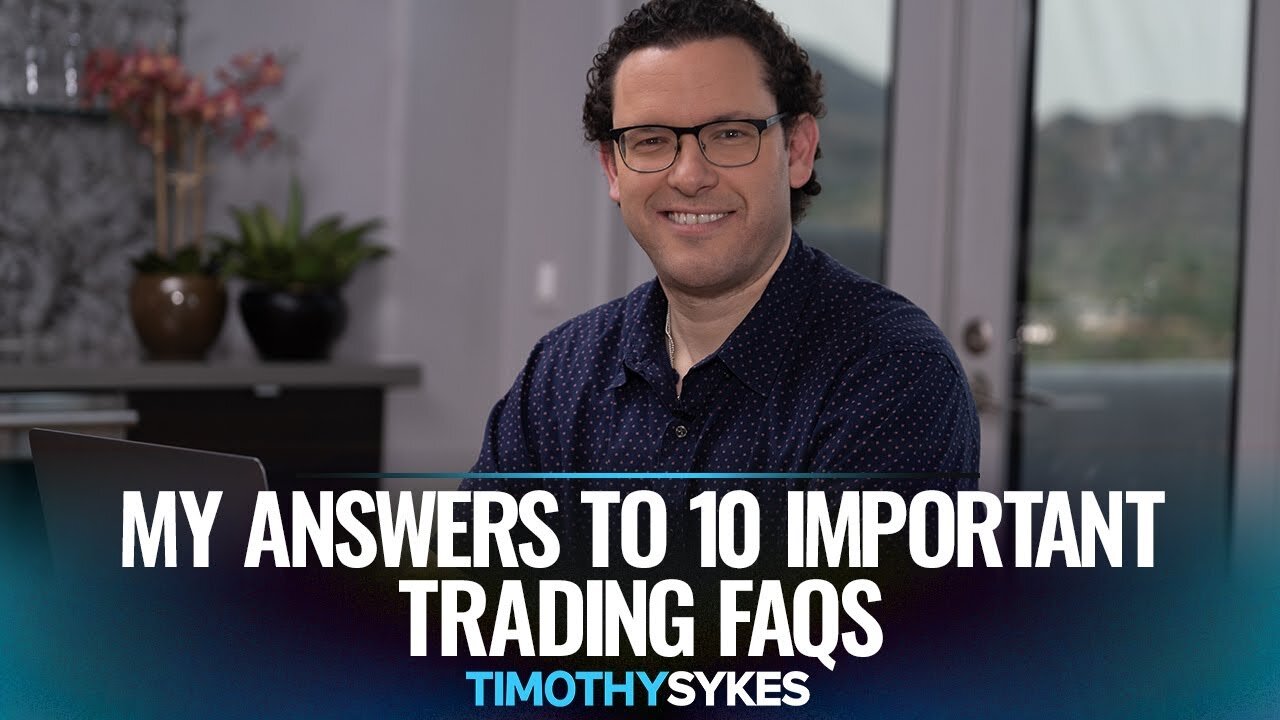Margin Rate: Definition, How It Works, Benefits, & Risks
Traders often ask me about margin rates and whether they should take advantage of margin accounts to get access to more trading capital…
First, remember that most traders lose money. If you borrow more than you have, you could become indebted to your broker or lose a significant chunk of your account FAST. I don’t rely on leverage, and neither do my top students.
So let’s talk about margin rates and the risks and benefits of margin accounts…
What Is a Margin Rate?
In trading, there are two types of accounts: cash and margin.
A margin account gives you the ability to take out loans from your broker. The broker will charge you interest — a margin rate — for that privilege. It’s like paying interest on a mortgage loan to buy a house.
How Does Margin Rate Work?
Margin rates are tied to the amount of money you have in your brokerage account and how much leverage you use. In general, the bigger your account, the better your rate will be.
You’d use margin to borrow shares from your broker for short selling a stock you think is overpriced and poised to drop. You’d buy the shares back at the new, hopefully lower price, and return them to the broker to close the position. You’d pay interest on the shares for the time the trade was open.
Brokers also charge interest for leverage. Some brokers are willing to loan you a 1:1 ratio, meaning they’ll match the amount in your account. Leverage is using more than what you have in your account. It could be another amount: I’ve seen 2:1, 4:1, even 100:1.
I NEVER use leverage, and neither do my top students. And I wouldn’t recommend that anyone use it. It’s far too risky. Learn to trade smart instead. (New to penny stocks? Read my FREE online penny stock guide here.)
What Factors Affect Margin Rate?
A lot comes down to economics, like interest rates, for example. And, of course, supply and demand…
I often talk about supply and demand when it comes to float rotation. It’s the same with margin rates. If demand goes up, rates will rise. When demand falls, so do rates. The same concept can also apply to the supply curve. Too much supply lowers prices, and not enough supply raises them.
There’s also government policy. When the Federal Reserve raises or lowers its target for borrowing, interest rates follow. The Fed also influences rates by buying securities in the markets.
What Is Trading on Margin?

I only use margin accounts for short selling, and I don’t do much of that anymore. There’s a lot of risk in short selling and trading with leverage.
That doesn’t mean you shouldn’t learn to short sell. I’ve made money going both long and short, and I have several students who actually prefer to short. It’s about finding what works for you.
Check out the 30-Day Trading Bootcamp I put together with one of my top students, Matthew Monaco. It’s a guide that can help you learn the basics of going long and short and a solid way to find your footing in the market.
What Are the Benefits of Margin?
It’s good to have the opportunity to short sell if you want. If you see a stock that you believe is ripe for a fall, you want to have the chance to short it.
Like I said, I don’t recommend shorting, especially if you’re just starting out. The market’s been hot, and shorting is tough to begin with. I’d focus primarily on buying. Personally, I’ve been big into dip buying recently.
You don’t need a margin account for buying, but you could have one just in case you’re prepared for this riskier strategy. You wouldn’t want to be ready for a great short play — only you can’t trade it because you only have a cash account.
What Are the Risks of Margin?
Everything comes with some risk, right? It’s up to you how much risk you want to take on. I say this all the time, but it’s worth repeating again: My #1 rule is to cut losses quickly. That’s the single most important thing you can do to protect yourself in the markets.
When it comes to margin accounts, you can actually lose more money than you have in your account and end up in debt to your broker…
Let’s say you short 1,000 shares of a stock at $3 a share. That’s $3,000 in that stock. But suppose instead of going down, the price continues to rise. You ignore my #1 rule and try to hold on through the pain. The stock goes up to $15. You now have an unrealized loss of $12,000.
If you end up having an unrealized loss bigger than your account, your broker’s risk tolerance is triggered, and they force you into the dreaded margin call. You either put in more cash into your account or sell off your position.
It’s the same with leverage. If something sounds too good to be true, it is.
Buying on leverage sounds good when stocks move slightly higher and you see bigger gains. With bigger potential gains come bigger potential losses. And as you know, most traders lose.
So why would you use leverage?
How Is a Margin Rate Calculated?

The margin rate depends on the broker and on the overall trend in interest rates.
Suppose your broker charges 10% annual interest for margin. You’ll only be charged the full 10% annual rate if you hold for a year.
Here’s how you can calculate the borrowing cost:
- Take the amount of money you borrowed (say, $3,000, like the example above).
- Multiply that amount by the interest rate ($3,000 x 10% = $300).
- Divide the calculated number by the number of days in a year ($300 / 365 = 0.8219).
- Multiply the number of days you used the margin. For this example, that’s 10 days (0.8219 x 10 = 8.22).
In this example, you’d pay $8.22 in interest on the $3,000 margin to purchase the stock.
Trading on Margin
Like I said, I never use leverage to trade, and I don’t recommend it to anyone. Trading on margin gives you access to more money to trade with — money that isn’t yours. Some traders believe it gives them the potential to earn more profits faster.
But there’s a flip side to this…
What Is Margin Buy and Margin Sell?

Note that buying on margin is not the same as selling on margin (short selling). Both strategies require a margin account and charge interest, yet they’re very different.
When you short sell, you’re selling shares you don’t own. The cash in your account is collateral for the position to ensure you’ll buy back the shorted shares and return them in the future.
Buying stock on margin uses the same collateral principle. The difference is that you’re using money you don’t actually have. The cash in your account is the broker’s guarantee on the loaned money. Remember, the broker has the option to liquidate or call your position when their risk tolerance is hit.
What Are the Lowest Margin Rates?

Rates vary by account. Interactive Brokers and M1 Finance have the lowest margin rates. Interactive Brokers’ lowest rate for a $10,000 account is 1.59%. My two preferred brokers are Interactive Brokers and E-Trade.
Why Are Interactive Brokers’ Margin Rates so Low?
Interactive Brokers charges more general fees and offers different packages. This allows them to charge lower interest on some products, which could attract potential customers.
What are Good Brokers for Margin Trading?
I’ve never minded paying fees or interest. You get what you pay for. I teach people to trade like a sniper, only targeting the best plays. If you’re following that philosophy, then fees are negligible.
I’ve tried dozens of brokers over the years. There’s no perfect broker. I like Interactive Brokers for their low rates and E-Trade because they can provide a good number of shares to short — that’s not always easy to find.
When Should You Buy on Margin?

When should you buy on margin? Never!
I don’t know how to make it clearer: You shouldn’t buy on margin. The only reason I have those accounts is to short sell when there’s a perfect setup.
If you’re buying on margin, that means you don’t have enough money in your account. That probably means you can’t afford to or don’t want to cover potential losses.
I NEVER buy on margin.
Big positions relative to your account invite disaster. If you play with fire, you’re gonna get burned, maybe beyond recognition. Don’t be reckless. Never trade too big or without any risk management. Small gains add up!
Frequently Asked Questions About Margin Rates

Here are some of the most common questions I get asked about margin rates.
What Is the Current Margin Rate?
The rate will vary from broker to broker and will depend on how much cash is in your account. There’s no one set rate for margin accounts.
What Happens If You Don’t Pay a Margin Call?
If you don’t pay the call, a broker can close out your position. This is a forced liquidation. Brokers have risk tolerances and will close out positions to protect their own bottom lines.
How Do You Pay Back a Margin Balance?
You have to close out all of the open positions in your account. The proceeds pay off any margin loans outstanding first before going back to your account cash balance.
What Is the Fidelity Margin Rate?
Fidelity’s rate for account balances up to $24,999 is 8.325%.
Does a Margin Account Affect Credit Scores?
Margin accounts don’t affect credit scores. They aren’t reported to credit agencies.
Bottom Line About Margin Rates

While I think having a margin account can be good if you want the option to short sell the perfect setup…
I HATE leverage. I don’t even like going all in on stocks. Any trade can go against you, no matter how sure you are.
My students and I focus on taking singles and cutting losses quickly. Singles really do add up over time.
Knowledge is power when it comes to trading. Too many traders fail because they don’t want to put in the work. They jump into trades unprepared.
Are you ready to work? Apply for my Trading Challenge. It’s based on my 20+ years of trading experience, and you’ll have access to all my webinars, video lessons, my DVDs, and my incredible chat room. All my top students started out in the Challenge and refined my strategies to fit their own styles. Are you up to it?
Do you have a margin account? Trade on margin? Let me know in the comments … I love to hear from my readers!
The post Margin Rate: Definition, How It Works, Benefits, & Risks appeared first on Timothy Sykes.
Originally found on Timothy Sykes Read More





